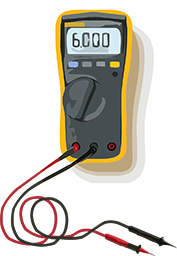Tax Deductions for Electricians and Tradesmen

Electrians and other tradesman are required to report their income to the IRS just like other workers. If you work for another person, you're considered an employee, and will receive a Form W-2, Wage and Tax Statement from your employer. If you work outside your employer, or run your own service business, you're considered self-employed, and any income you receive needs to be reported on a Schedule C, Profit or Loss from Business. Those whom you provided service to may supply you with a Form 1099-MISC, but you have to report your income regardless of whether or not you receive a 1099. Any self-employment income of $400 or more is subject to self-employment tax.
Unreimbursed expenses incurred on the job may be deductible, which can lower your tax liability. If you're an employee, you can deduct them on a Schedule A, Itemized Deductions. Self-employed electricians can deduct expenses right on their Schedule C. No matter which form you use, you should always have receipts and documents to substantiate the expenses.
Some examples of deductible expenses include:
- Costs associated with work-related magazines and trade publications subscriptions
- Union dues or professional affiliation fees
- Liability and protection from wrongful acts insurance premiums
- Specialized equipment replaceable inside of a year
- Safety equipment such as steel-toed boots and goggles
- Maintenance and cost of uniforms, provided the uniforms are required and not suitable for `streetwear
- State and local administrative fees, licenses, or flat-rate occupational taxes, if the charges are not paid for initial certification
If you're searching for a job, you may be able to deduct expenses incurred while job hunting, as long as your searching for a job as an electrician (or your previous field of employment). Holding odd jobs during unemployment doesn't automatically disqualify you from deducting the expenses.
Educational classes can be deducted if they are related to your job and are not used to meet the minimum requirements for your work. This generally includes refresher courses, vocational classes, and classes that discuss new developments in the field. Classes that qualify you for a new job are not deductible.
Self-employed tradesmen may have additional deductions available on a Schedule C. These include:
- Bas business debts
- Car and truck costs for traveling between work sites
- Legal and professional fees
- Rental costs for business use property
- Travel costs if you are gone longer than a typical business day away from your tax home. Including, lodging, transportation costs, and meals, with limitations.
- Advertising
- Excise taxes and property assessments
- Tools and equipment maintenance
- Supplies and materials



